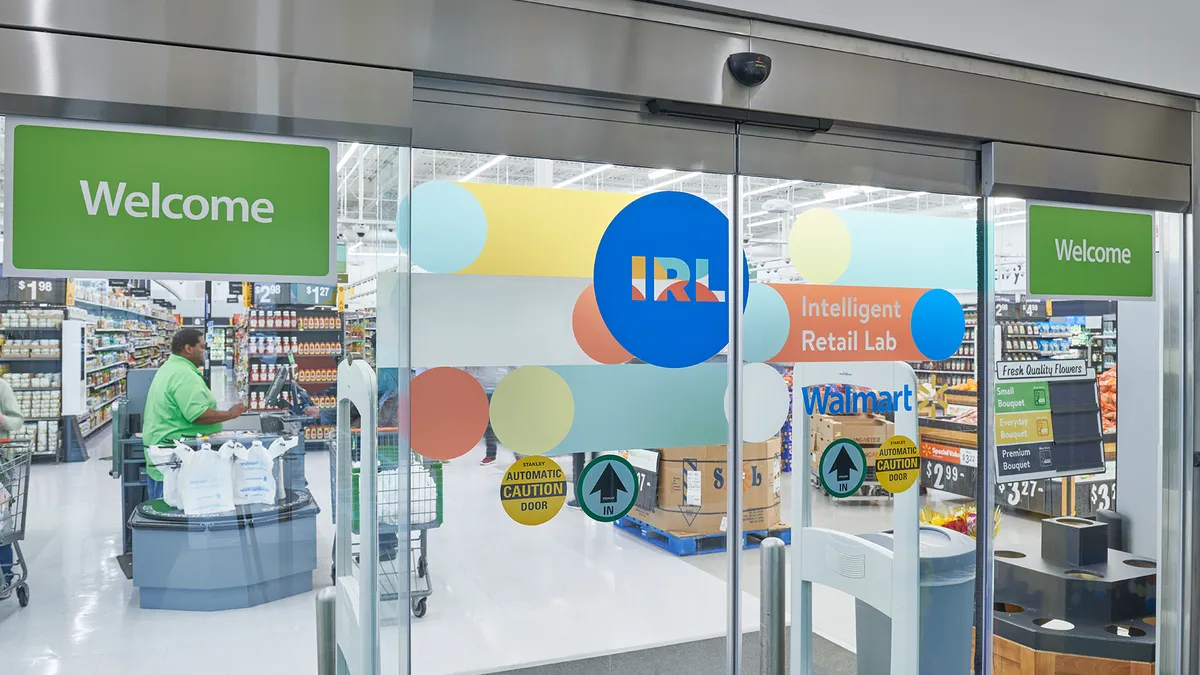Dive Brief:
- A Walmart Neighborhood Market in Levittown, New York has been transformed into the company's first Intelligent Retail Lab (IRL), according to a company announcement. The 50,000 square-foot store is now equipped with artificial intelligence (AI) technology to enhance the shopping experience and improve business operations.
- The IRL store is equipped with AI-enabled cameras, sensors, interactive displays and a 100-server data center that is visible to customers. Hardware in the store is connected with enough cabling to scale Mt. Everest five times and enough processing power to download 27,000 hours of music per second, according to Walmart's news release.
- Walmart will use AI throughout the store to gather information, track inventory, determine whether or not meats and produce are fresh and identify spills or hazards that need attention. AI tools will also help Walmart reduce lines and wait times in store, replenish shopping carts and ensure online orders are always ready for in-store pickup.
Dive Insight:
Walmart is bringing AI out into the open with its latest effort. As soon as shoppers walk into the store, they'll see bright colors, techie decor and a glass-encased data center illuminated for customer viewing. The IRL store is also equipped with educational kiosks upfront where customers can learn more about the technology, and an interactive wall shows shoppers how AI can track body positioning.
Although AI is becoming increasingly important to grocers, it's an amorphous concept for most consumers. Removing the mystery of in-store technology could be key in gaining shopper trust and helping them understand how AI can work in beneficial ways.
"We chose right from the very start to not hide the technology," said Mike Hanrahan, CEO of IRL, in a statement.
With its many cameras looking down from the ceiling, the IRL store brings to mind Amazon Go. But where that concept centers on frictionless checkout, Walmart's sensor network primarily monitors shelf performance. Walmart has also rolled out aisle-scanning robots in more than 300 stores as it seeks to improve store efficiency and get the most out of its workers.
Walmart said its Levittown Neighborhood Market on Long Island is one of the company's busiest banner locations, and if the IRL concept works well there and resonates with shoppers, the retailer is confident it can be rolled out on a broader scale.
For now, the company is focused on starting with real-life, practical applications for AI that will make the most difference to shoppers and Walmart associates on a daily basis. From tracking the freshness of meat and produce to opening more cash registers when lines get long, customers are likely to see a more efficient shopping experience and employees will be freed up to focus on customer service.
"Technology enables us to understand so much more — in real time — about our business," Hanrahan said. "When you combine all the information we're gathering in IRL with Walmart's 50-plus years of expertise in running stores, you can create really powerful experiences that improve the lives of both our customers and associates."
Brick-and-mortar retailers are quickly adopting artificial intelligence to improve efficiency and streamline operations. Ahold Delhaize recently introduced an artificial intelligence supply chain solution to help manage its perishable offerings, which will be rolled out across its banners in the next three years. Giant Foods has deployed "Marty" the robot to 172 stores, with the goal to expand the robot's functions as the banner better understands how to apply AI. Kroger has plans to open as many as 20 automated Ocado fulfillment centers, which will use AI to speed up online grocery order fulfillment. The first facility is currently under construction in Monroe, Ohio.
















